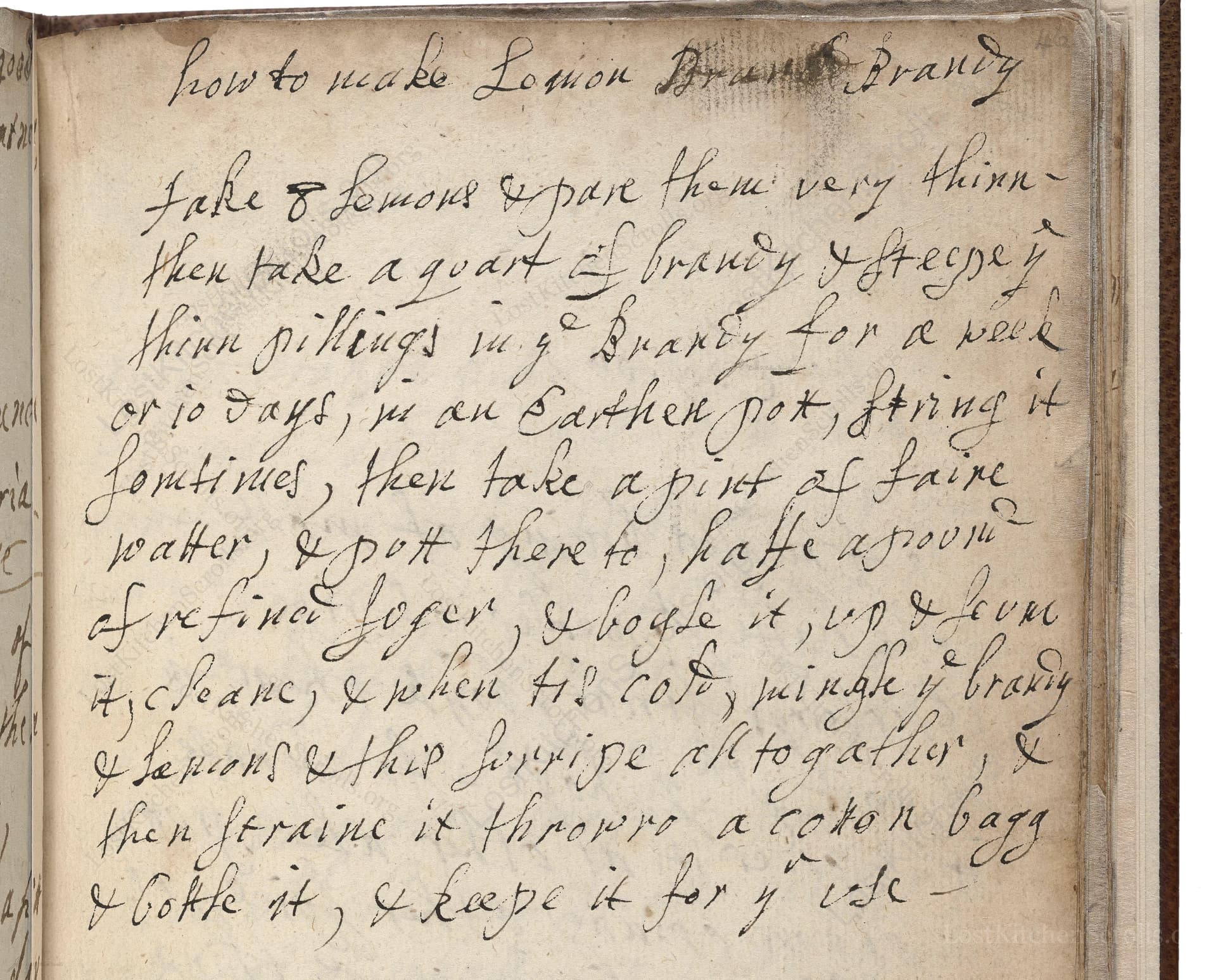How To Make Lemon Brandy
From the treasured pages of Cookery book of Lettice Pudsey, Seisdon, Staffordshire
Written by Lettice Pudsey

How To Make Lemon Brandy
"Take 8 Lemons & pare them very thinn- then take a quart of brandy & steepe ye thinn pilleings in ye Brandy for a week or 10 days, in an Earthen pot, stiring it somtimes, then take a pint of faire watter, & putt there to, halfe a pound of refind suger, & boyle it, up & scum it cleane, & when tis cold, mingle ye brandy & lemons & thir syrripe all togather, & then straine it throwro a coton bagg & bottle it, & keepe it for yr use -"
Note on the Original Text
The original recipe is written with charming period spelling ("refind suger," "ye thinn pilleings") and a flowing narrative style without bullet points or precise timings. Instructions rely on the cook's judgment—terms like "steepe" and "boyle it up" suggest both patience and attentiveness. Quantities are imprecise by modern standards but were typical in 17th-century household manuscripts, reflecting both the oral tradition and hands-on experience.

Title
Cookery book of Lettice Pudsey, Seisdon, Staffordshire (1675)
You can also click the book image above to peruse the original tome
Writer
Lettice Pudsey
Era
1675
Publisher
Unknown
Background
Step into the 17th-century kitchen with Lettice Pudsey's delightful collection of recipes, where flavors, creativity, and tradition mingle to create a feast fit for Restoration-era tables. Expect a medley of hearty English fare, intriguing ingredient combinations, and a pinch of culinary wisdom from a bygone age.
Kindly made available by
Folger Shakespeare Library
This recipe hails from 1675 and is attributed to Lettice Pudsey, a gentlewoman compiling practical wisdom for her household. At the time, infused and cordial spirits were a fashionable way to preserve and enliven costly imported liquors, often showcased during gatherings of the gentry. Lemons themselves were a prized and somewhat exotic fruit, indicating some status. Recipes like this were often copied between families, reflecting both an experimental spirit and a need to conserve precious ingredients.

Pudsey would have used an earthenware pot for infusing the brandy, a wooden spoon for stirring, a copper or iron pan for boiling syrup, and a coarse linen or cotton bag to strain the finished cordial. Bottling would have been done using glass bottles with wax-sealed stoppers.
Prep Time
20 mins
Cook Time
10 mins
Servings
20
We've done our best to adapt this historical recipe for modern kitchens, but some details may still need refinement. We warmly welcome feedback from fellow cooks and culinary historians — your insights support the entire community!
Ingredients
- 8 lemons (preferably unwaxed)
- 1 quart brandy
- 2 cups water
- 8 oz refined sugar (white sugar)
Instructions
- To make Lemon Brandy as Lettice Pudsey might have in 1675, start by finely peeling the zest from 8 fresh lemons, ensuring you avoid the bitter white pith.
- Place these zest strips into a sterilized glass or ceramic jar and cover them with 1 quart of good-quality brandy.
- Let the mixture sit and infuse for 7–10 days, stiring gently every so often.
- Separately, combine 2 cups of clean water with 8 ounces of refined (white) sugar in a saucepan.
- Bring to a gentel boil, skimming off any foam, until the syrup is clear, then allow it to cool completely.
- Once your lemon zest and brandy mixture is ready, strain out the solids.
- Mix the lemon-infused brandy with the cooled syrup, stir well, then strain everything through a fine muslin or cheesecloth.
- Decant the finished Lemon Brandy into clean bottles and store in a cool, dark place for sipping or culinary use.
Estimated Calories
170 per serving
Cooking Estimates
Preparing this Lemon Brandy recipe takes about 20 minutes for peeling, infusing, and making the syrup. The only cooking is making the sugar syrup, which needs a few minutes of boiling. The lemon peels need to steep in brandy for about a week, but most of that is hands-off time.
As noted above, we have made our best effort to translate and adapt this historical recipe for modern kitchens, taking into account ingredients nowadays, cooking techniques, measurements, and so on. However, historical recipes often contain assumptions that require interpretation.
We'd love for anyone to help improve these adaptations. Community contributions are highly welcome. If you have suggestions, corrections, or cooking tips based on your experience with this recipe, please share them below.
Join the Discussion
Rate This Recipe
Dietary Preference
Main Ingredients

Den Bockfisch In Einer Fleisch Suppen Zu Kochen
This recipe hails from a German manuscript cookbook compiled in 1696, a time whe...

Die Grieß Nudlen Zumachen
This recipe comes from a rather mysterious manuscript cookbook, penned anonymous...

Ein Boudain
This recipe comes from an anonymous German-language manuscript cookbook from 169...

Ein Gesaltzen Citroni
This recipe, dating from 1696, comes from an extensive anonymous German cookbook...
Browse our complete collection of time-honored recipes



